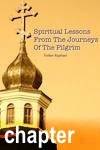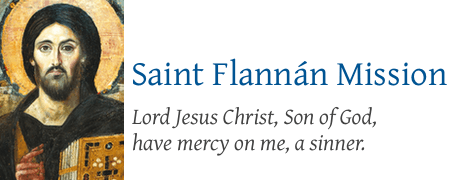 How do we view our responsibilities? How do we alleviate our fears? How do we view worship and liturgies?
How do we view our responsibilities? How do we alleviate our fears? How do we view worship and liturgies?
Dear beloved,
The pilgrim walked through a heavy rain for two days, and became exhausted. Eventually, he found a small farmhouse manned by a drunken old man, and asked if he could stay the night. The old man was a postmaster and the farmhouse was the community post office. The postmaster checked through the pilgrim’s passport and permitted him to stay. The postmaster’s cook was a young lady, and made a bed for the pilgrim.
Deep in the night, some loud crashing noises woke the postmaster’s cook up in frightful terror. The pilgrim and the postmaster both also woke up, and all three of them discovered that a royal courier crashed from his horse carriage, with a stake through his head. Even with the serious injury, the royal courier braved on, and galloped off, intending to carry out his job responsibilities (2 Timothy 2:15).
Six years later, the pilgrim prayed at a women’s monastery. A humble nun poured tea for the pilgrim. Then the pilgrim realized the nun was the young cook who worked for the postmaster six years ago. After her frightful encounter with the royal courier’s injury, she was so frightened she went insane. Her family brought her from monastery to monastery to no avail, until she was brought to the monastery where she was healed (Proverbs 29:25). She gave her life to God, and became a nun.
The pilgrim journeyed on, and on one summer day, he heard the bells of a church, and went in to attend the Divine Liturgy. A young, frail priest celebrated the Liturgy very slowly. The pilgrim was very moved by the slow, faithful way the young priest served the Liturgy. The priest told the pilgrim, that even though his parishioners disliked his ways, he loved to reflect on every word of the Divine Liturgy, and savor the whole experience with inner reflection and prayer. The pilgrim wondered how could one find this inner enlightenment. The priest explained that one needs to take a single passage from the Holy Bible, meditate and spend time on that single passage, and take as long as needed, and God will shine His light to allow one to understand it. The same thing goes for prayer as well. Prayer cannot be rushed, or cavalier, but must be savored and reflected slowly, as long as it takes.
I would humbly make an analogy that the study of Holy Scriptures and prayer should be like expensive caviar, something you would enjoy and experience slowly, not rushed through. It should not be rushed through like a chore or fast food. Prayer, like the study of Holy Scriptures, is a labor of love. It needs tremendous effort, especially to fend off the many distractions, delusions, and temptations of the evil one. It will be an uphill climb, but thoroughly worth every effort (St Mark 11:22-25).
After dinner, the pilgrim overheard an old lady whispering the Jesus Prayer. He was very moved by the piety of the old lady. The old lady replied that the only joy she could experience at her age was to seek God’s forgiveness. She had been praying the Jesus Prayer since she was a little girl, and she could not do without the Jesus Prayer. When she was a young lady, her parents wanted to give her away in marriage, but the groom-to-be died suddenly and she decided to lead a celibate life and prayed unceasingly.
Not all of us have the blessing to pray unceasingly yet. But it would be a sensible question to ask ourselves – do we ask God’s forgiveness only at the end of our journey in life? Or should we start now, and do it often while acknowledging Him as our Lord and Savior (Ezekiel 18:30)? We will never know the hour of our death, so let us always pray to Him, every breath, every heartbeat, every step. Let not our youth or old age, fit or unfit, stop us.
A soldier once asked Abba Mius if God would accept the repentance of sinners. Abba Mius asked the soldier if his cloak is torn, would he throw it away? The soldier replied, “No. I will mend it and wear it again.” Abba Mius then said, “If you would mend your cloak and wear it again, wouldn’t God care a lot more about His precious creation?”
The pilgrim journeyed on, and met a retired captain and chatted with him on prayer. The captain relied on the writings of Saint Gregory Palamas, father among the saints. The pilgrim suggested the captain read the Philokalia, which went further from the oral form of the Jesus Prayer in Saint Gregory Palamas’ writings, to the complete and perfected teaching on the inner spiritual Jesus Prayer. Such is the fullness of the faith in the Orthodox Church, and the many splendors of a wide spectrum of available teachings from various fathers of the Church, all Divinely inspired by the Holy Spirit through 2,000 unbroken years of Church history.
The pilgrim thanked his spiritual father after relating all his journeying stories, and said he would continue to make his way to Jerusalem. His spiritual father blessed him, and wished that God’s grace would be with the pilgrim, just as Archangel Raphael journeyed with Tobit and his son Tobias (Tobit 12:14-15). The Archangel Raphael is the protector of pilgrims and their prayers, and brings God’s healing to God’s children.
As we close with our reflection of “The Way of a Pilgrim”, let us pray:
“Lord Jesus Christ, Son of God, have mercy on me, a sinner.”
Book Index | Prev: Fruits of prayer | Next: Mysteries of Divine Will
